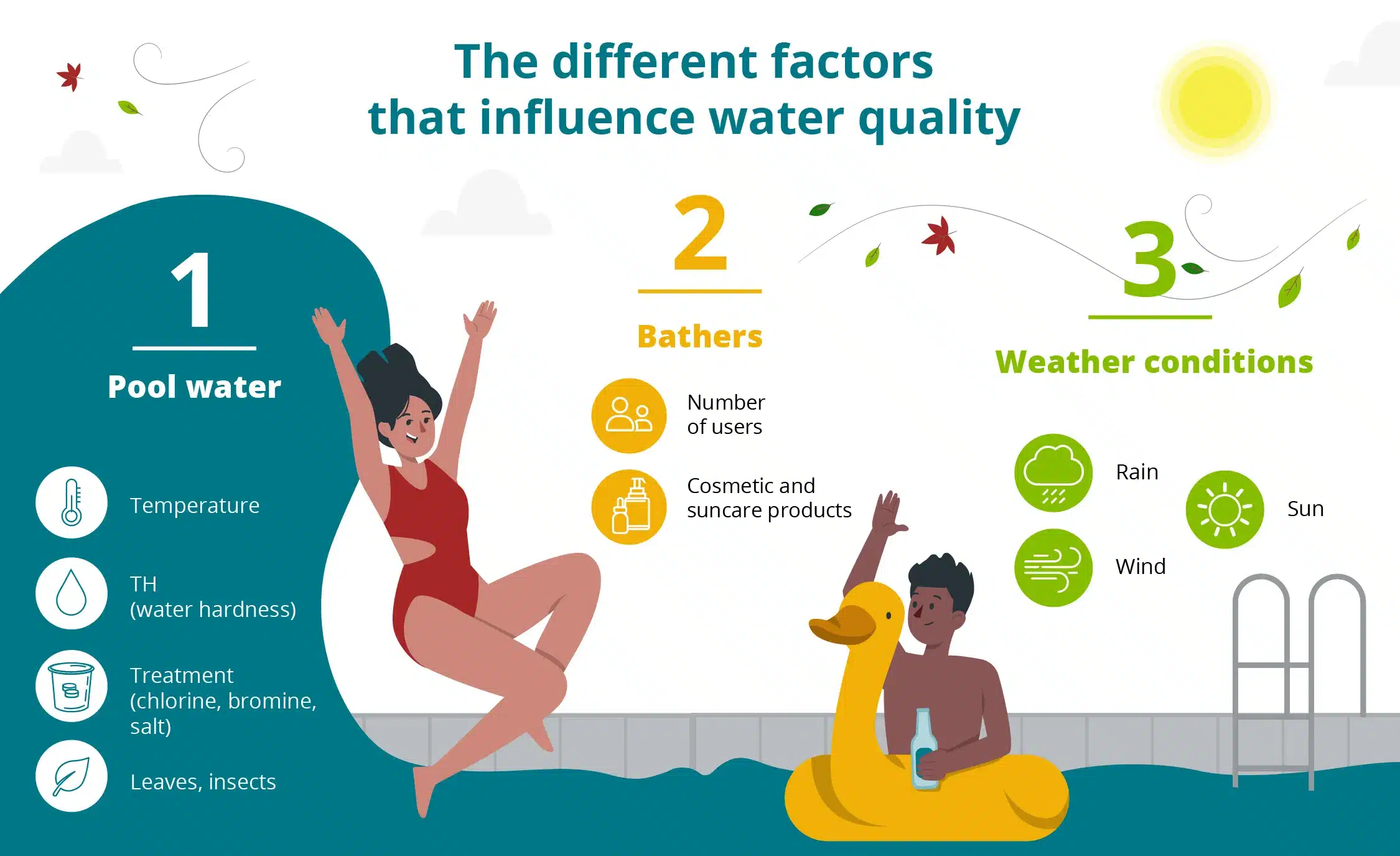The quality of the water in your swimming pool is essential to guarantee safe and enjoyable bathing. There are many factors that influence this quality, and it is crucial to be aware of them if you are to control them effectively. In this article, we'll take a detailed look at these various elements, provide tips on how to manage them and suggest monitoring tools for maintaining crystal-clear, healthy water. Whether you own a swimming pool or are thinking of installing one, this infographic and practical advice will help you to optimise the maintenance of your pool and ensure an optimum swimming experience.

Warm water is ideal for swimming, but it also encourages the proliferation of algae and bacteria. The warmer the water, the more it evaporates, concentrating contaminants.
Tip : Use a pool cover to limit evaporation and adjust the temperature with a control system.
Too low a pH can cause eye irritation, while too high a pH can lead to limescale deposits. Maintain pH between 7.2 and 7.6 ( bromine/salt treatment) and 7,0 and 7,4 ( chlorine treatment) for optimum comfort.
Tip : Test the pH of your pool regularly and adjust it with specific products to maintain a perfect balance.
Water that is too rich in calcium can form limescale deposits, while water that is too soft can corrode your equipment.
Tip : Use products to adjust water hardness and protect your installations.
The wrong dose of chemicals can unbalance the water and harm the health of bathers.
Tip : Follow chemical product instructions carefully and test regularly for accurate dosage.
Without chlorine, microbes proliferate; with too much chlorine, the smell becomes unpleasant and can irritate the skin.
Tip : Test and adjust the chlorine level regularly to ensure effective disinfection without excess.
For salt-treated pools, keep the salt level between 2700 and 3400 ppm for optimal operation of the chlorination system.
Tip : Use a salinity tester and adjust the salt level by adding salt or diluting with fresh water.
Leaves, insects and other debris encourage the growth of algae and impair water quality.
Tip : Use a landing net regularly to remove debris and clean the filters to keep the water clean.
The more bathers there are, the more contaminants there are in the water.
Tip : Ask bathers to shower before entering the pool and plan regular toilet breaks.
Sun creams, oils and soaps can form a film on the water and introduce undesirable chemicals.
Tip : Opt for products that are compatible with swimming pools and reduce their use as much as possible.
Specific weather conditions impact water quality. Rain can dilute chemicals, while wind brings debris into the water.
Tip : Cover your pool during bad weather and adjust the chemicals after heavy rain.
Maintaining high-quality pool water requires constant attention and precise management of the various factors influencing its condition. By understanding and monitoring temperature, pH, hardness, chlorine levels and salinity, as well as regularly removing organic debris and using appropriate products, you can guarantee clean, safe water. What's more, paying attention to weather conditions and how bathers use the pool will help to maintain water quality. With good practice and the right tools, you can enjoy your pool to the full while ensuring the health and well-being of all its users.
| Cookie | Duration | Description |
|---|---|---|
| cookielawinfo-checkbox-analytics | 11 months | This cookie is set by GDPR Cookie Consent plugin. The cookie is used to store the user consent for the cookies in the category "Analytics". |
| cookielawinfo-checkbox-functional | 11 months | The cookie is set by GDPR cookie consent to record the user consent for the cookies in the category "Functional". |
| cookielawinfo-checkbox-necessary | 11 months | This cookie is set by GDPR Cookie Consent plugin. The cookies is used to store the user consent for the cookies in the category "Necessary". |
| cookielawinfo-checkbox-others | 11 months | This cookie is set by GDPR Cookie Consent plugin. The cookie is used to store the user consent for the cookies in the category "Other. |
| cookielawinfo-checkbox-performance | 11 months | This cookie is set by GDPR Cookie Consent plugin. The cookie is used to store the user consent for the cookies in the category "Performance". |
| viewed_cookie_policy | 11 months | The cookie is set by the GDPR Cookie Consent plugin and is used to store whether or not user has consented to the use of cookies. It does not store any personal data. |